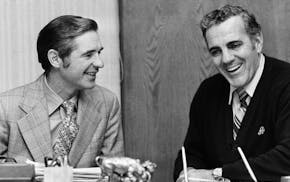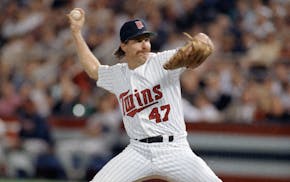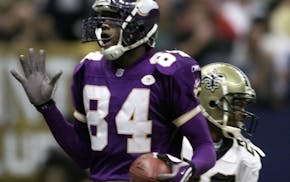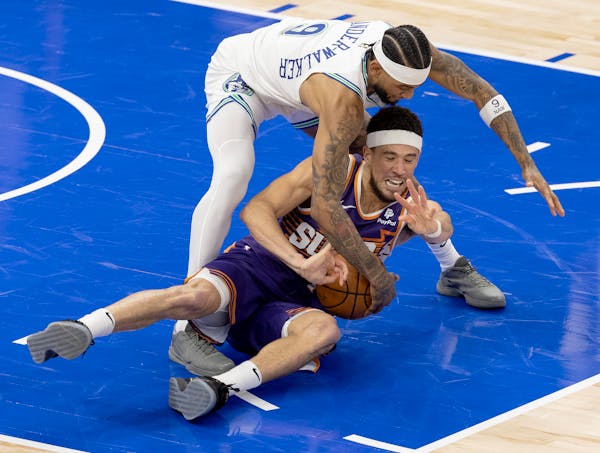The Twin Cities lost the Lakers in 1960 and the North Stars in 1993 because of the lack of decent facilities being provided and because the political climate wasn't right for building those decent facilities. And we almost lost the Timberwolves in 1994, and the Twins were up for elimination in 2001.
The Lakers moved to Los Angeles, where they remain one of the NBA's showcase franchises. The North Stars won a Stanley Cup as the Dallas Stars in 1999. The Wolves remained at Target Center only because NBA Commissioner David Stern wouldn't allow the team to move to New Orleans, and a Hennepin County judge's injunction helped ensure the Twins would play the 2002 season.
Now it's pretty evident that with the Anschutz Entertainment Group having secured a $700 million naming deal from Farmers Insurance for the Los Angeles football stadium that AEG plans to build, there is greater danger than ever of losing the Vikings if a new stadium bill isn't passed by the current Legislature.
Yes, a new football stadium would be used only 10 days a year by the Vikings, but if it were a covered stadium it could be used more than 300 times a year for other uses and also be a candidate to play host to big events such as a Super Bowl and the NCAA Final Four. And every time a Vikings home game is played, Minneapolis picks up $9.1 million spent by those attending.
The fact that some in Los Angeles are determined to build a new stadium and work hard to get two teams is no longer just a rumor.
Tim Leiweke, the CEO of AEG who was instrumental in getting Staples Center built in downtown L.A., is confident that his city will eventually get two NFL teams to move. And because AEG's new stadium won't be ready until 2015, he said that the teams could play immediately in either the Los Angeles Coliseum or the Rose Bowl in Pasadena.
Having lost the Lakers and North Stars and coming close to losing the Wolves and Twins, I believe that if a new stadium bill isn't passed in the Legislature this year, that the Wilf family, owners of the Vikings, will take advantage of the fact that their lease at the Metrodome runs out after the 2011 season and try to persuade Commissioner Roger Goodell and other NFL owners to allow them to be one of two teams that will eventually move to Southern California.
The collapse of the Metrodome roof following a December snowstorm also will put the Wilfs in a position to get a favorable vote to relocate, because without a new stadium the Wilfs are not assured that once the roof is repaired, the same problem won't come up again.
Furthermore, unlike the Pohlad family that owns the Twins and Glen Taylor, the Wolves owner and Mankato businessman, the Wilf family doesn't have any connection with this community. They won't have to worry about hurting their local businesses if they move the Vikings.
Came close to losing Twins Those politicians who insist the Twins never came close to moving have forgotten what kept them from being eliminated by Major League Baseball in 2001. The Metropolitan Sports Facilities Commission, which runs the Metrodome, was successful in suing the Twins and obtaining an injunction to prevent the team from folding, forcing it to fulfill its lease for 2002. It was Judge Harry Crump's temporary injunction that barred Major League Baseball from interfering with the Twins' 2002 season.
You also can credit the three sons of the late Carl Pohlad for keeping the Twins here. Being heavily involved in the business world here, Jim, Bill and Bob Pohlad knew they would have had a hard time operating here if the family was responsible for removing Major League Baseball from this area.
Time after time, Carl told me he was sick of losing money on the team in the 1980s and wanted to sell or move the franchise, but his sons persuaded him otherwise. Finally, after many long years of fighting for a new ballpark, the result was Target Field, with a great contribution by the Pohlad family to make it one of the best in the country. Had Target Field not been built, the Twins eventually would have left town.
We didn't keep the Lakers here because their home facility, the old Minneapolis Auditorium, wasn't available for them whenever they made the playoffs. As a result, games had to be moved to the Armory, the old St. Paul Auditorium and even the Hamline gym.
As for the North Stars moving, the MSFC wouldn't make any improvements to Met Center in Bloomington, and so Norm Green moved the team to Texas, only three years after first being hailed as a hero for acquiring the team.
And the only reason Minneapolis kept the Wolves is that Stern and the league wouldn't allow former owners Marvin Wolfenson and Harvey Ratner to sell the team to a New Orleans group because of questions over that group's finances. Taylor bought the team so it could stay here.
My conclusion is that with the Metrodome being a questionable facility for the Vikings, with the Wilfs not having any real connection here and with Los Angeles in the process of building a new stadium, the city of Minneapolis could possibly set a record by losing three major league teams if a new stadium isn't provided.
McCarthy had tough start Pat Poore, the wide receivers coach for new Gophers coach Jerry Kill, will watch the Packers play in the Super Bowl on Sunday against the Steelers and remember when Green Bay coach Mike McCarthy got started in coaching as a graduate assistant in 1987 and '88 at NCAA Division II Fort Hays State in Hays, Kan. McCarthy lived in the basement of the Poores' residence.
"When I was the offensive coordinator out at Fort Hays in Kansas, Mike was a defensive graduate assistant for us," Poore recalled. "My wife and I were managing a fourplex, the basement was open, and so we just told him, 'Hey, throw your stuff down there and live down there.' So for two years, he ate a lot of dinners with us, babysat our kids, and you could tell even back then he was going to be a really good football coach."
McCarthy became a coach at age 23, not long after his playing days as a tight end at NAIA Baker University in Baldwin City, Kan.
"You know he had the work ethic and the knowledge," Poore said. "And when he left our place is when he went to [the University of] Pittsburgh; he actually worked at the Pennsylvania Turnpike at night and then went in and worked in the football office during the day.
"That's when Paul Hackett was there [as Pitt coach]. Jon Gruden was coaching the wide receivers there and [McCarthy] was a graduate assistant. "
Poore said when he was coach at Iowa Wesleyan in 1994 and '95, McCarthy was on the staff of the Kansas City Chiefs and had the good fortune of having great quarterbacks such as Joe Montana and Rich Gannon on the roster. Poore would go down to Missouri to visit McCarthy. Poore said he and McCarthy also met up in 2008, the first year Poore was at Northern Illinois.
"The one thing I always remembered about him was he was a very stand-up guy," Poore said. "His dad had owned a bar, had been a policeman in Pittsburgh, a very blue-collar, hard-hat, lunch-pail, work-ethic kind of guy."
Sid Hartman can be heard weekdays on WCCO AM-830 at 6:40, 7:40 and 8:40 a.m. • shartman@startribune.com

Sid Instant Replay from 1977: Vikings' Super Bowl loss to Raiders hurt the most

Read Sid's column from 1974, when Ara Parseghian left Notre Dame

Sid instant replay: No greater hero than Twins' Morris in World Series


